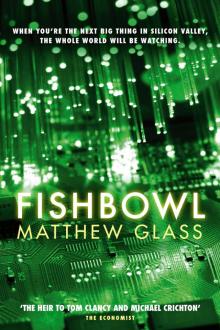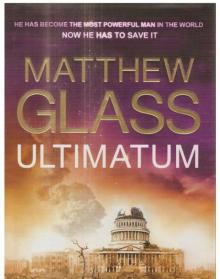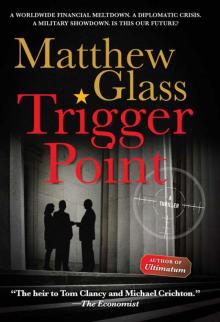- Home
- Matthew Glass
Ultimatum Page 9
Ultimatum Read online
Page 9
There was silence. Amy gazed at her father. Even Greg watched him out of the corner of his eye. Emmy, Heather and June, who had started talking about something else, looked around to see what was happening.
“I was just wondering where it’s all going to come from,” murmured Ray.
“Well, we’re working on that. But we’re going to have to pay. Our generation is going to have to put in. But it’s for our children, Ray, and our children’s children. And the way I see it, our generation is only living as good as it does because no one has paid yet. We haven’t taken any of the pain. And our parents didn’t, and our grandparents didn’t, but it’s no point complaining to them because they’re not here anymore. They figured we could keep growing our economies at the fastest pace and somehow with a nip here and a tuck there the environment would be okay and we could have the best of both worlds. Trading carbon credits would solve the problem. Well, you know what? It just made a bunch of traders rich. Or technology would do it for us. Well, plenty of time and money was spent on technology to get hold of fossil fuels that previously we couldn’t even access. Twenty, thirty years ago we should have started taxing fossil fuels at the true cost of the damage they do, like we’d do for any other commodity that causes public damage. We should have taken that money—and it would have been a huge amount of money—and put it right into research for the technologies that would replace those fuels.”
“Who?” said Ray. “Government?”
“Why not? Government funds basic health research, and we fund it out of taxes. Isn’t this just as important? Sure, at some point, you commercialize it. But if you’ve got a long-term crisis, and the market isn’t dealing with it because market incentives are focused on the short term, it’s the role of government to make sure the research gets done. That’s exactly what happens in health. Now, if we’d had that money and been putting it into research for the last thirty years, wouldn’t we have come up with solutions to replace fossil fuels? You bet we would. But we didn’t do that. We didn’t make fossil fuels pay their true cost because we were too damn scared it would take a little off our economic growth. And every time we had a slowdown, our fine words about saving the planet went right out the window and all we cared about wa s getting growth up again, whatever it took. Sure, we had plans. Too many of them. Obama’s plan, Currie’s plan. Some of them were even good plans, or would have been if we’d carried them through. The problem wasn’t not having enough plans, it was actually doing what we planned to do. Always some reason, some special interest group, some industry that needed an exemption. And we gave in to them, over and over and over. Come on, Ray. How much legislation, how many emissions targets have you and I seen go by the wayside because it turned out to be just too damn painful to stick to them and too damn easy to convince ourselves that the market or technology or some other thing would magically solve everything for us? And you want to know something—why not? Why should we have taken any pain, why should anyone, when you could be absolutely sure that no other government in the world was going to live up to the cuts they’d committed to make—not if it meant sacrificing even a single percentage point of growth—-and there was no mechanism to make them do it? That’s how it’s been. We haven’t done what we had to do, what we said we’d do. So for a start, we’re better off now than we have a right to be. And now the bill for the cost is here. It didn’t go away just because we ignored it. Someone’s got to pay.” Joe raised his hands. “It’s us. The buck stops here. It’s got to. We don’t pay the bill, it’s Amy, and it’s Greg, and it’s June and it’s Penny who are going to pay. And the bill will keep getting bigger. And you know what? Things happen when you don’t pay the bill. You go back to France in 1789. Hell, you don’t have to go to France. Look at 1776.”
Ray smiled. “You’re saying we’re going to have a revolution?”
“I’m asking you. I’m saying you’ve got ten million people suddenly dispossessed, in poverty, and what are they going to do? Now make that twenty million. Make it forty. I’m just saying we have to be aware of the historical processes we’re a part of. We’re only seeing the tip of the iceberg. If you think you know everything that’s been happening, if you think Gartner’s plan was sufficient, even at a minimum, even at the bare miserly, stingy minimum he proposed, then I’ve got to tell you...”
Joe stopped. Suddenly he was aware of the way everyone was looking at him.
“How many people did you say?” asked Heather.
Joe frowned for a moment, wondering how he had let that happen. He hadn’t meant to say that, or anything like it. “I was just saying ... if you don’t deal with it, who knows how bad it’ll get?”
There was silence.
He forced a smile. “At least there’s a saving grace. The American people understood. I can’t think of greater evidence of our common sense, of the spirit of our community, the spirit our Founding Fathers would have wanted to see in us, than that they said yes on November second. Because Mike Gartner was offering them the easy way, storing up more trouble for the future. And the American people said no, we’re going to face this trouble now.” The senator tapped his finger forcefully on the armrest of his chair. “We’re going to saddle up and go out and deal with it. They could have chosen the easy way but they didn’t. That’s what really makes me proud to be the next president of this country.”
“God bless America,” muttered Greg.
The senator turned to him sharply. “God bless America. You better believe it, Greg.”
There was silence again.
“Well, it’s Christmas,” said Heather. She cut the tension with a smile. “I’d say it’s about time for lunch.”
~ * ~
The Travises didn’t leave until almost sundown. Joe lingered outside, watching the sky go purple and the sun turn gold in the crisp winter air. The ranch was in the foothills of the Bradshaw Mountains, and the summits of Towers Mountain and Wasson Peak rose to the north.
“What was that you were saying before lunch, Daddy?”
Joe turned. It was Amy.
“Nothing, honey.”
“I’m not ten years old, Daddy.”
“It’s nothing. Things always cost more than you think, that’s all. You say five billion over five years, and it ends up being ten.”
Amy looked at him skeptically.
Joe smiled. “When are you going back to Stanford, honey?”
“When you stop changing the subject.”
“You coming back to Washington for New Year’s?”
“You’re worried about something, aren’t you? Is it Mr. Montera?”
“A little.”
“You think he did something wrong?”
Joe shook his head.
“They’re going to roast you over it. We don’t need that right now, do we?”
“No,” murmured Joe. “We certainly don’t.”
He put his arm around Amy’s shoulder. He had always felt a deep, instinctive connection with Amy. Not that he didn’t love Greg. But with Amy it was easy, natural. Sometimes, with Greg, it seemed to him that whatever he did only served to drive his son further away.
“Hugo’s a good man,” said Joe. “He’ll make a good secretary. I need good people. The country needs good people in Washington.”
“But they’re going to roast you, Daddy. All the way to the confirmation hearings. It doesn’t look good, what he’s accused of. Even if he didn’t do anything wrong, it doesn’t look good.”
Joe gazed at the last golden sliver of the sun, almost gone now.
“You know, your mom told me, if I wanted her to, she’d give up her job. She said it’s not worth all the vitriol that’s flying around out there in press-hate land.”
“And what did you say?”
“Yes it damn well is!”
Amy laughed.
Joe Benton chuckled as well. He looked at his daughter. “So are you coming back to Washington for New Year’s?”
Amy shrugged.
“Is ther
e someone there, at Stanford?”
“Daddy!”
“What?”
“Nothing.” She gave him a kiss. “Merry Christmas, Daddy.”
“Merry Christmas, Amy.”
~ * ~
Tuesday, January 4
Benton Transition Headquarters,
Lafayette Towers, Washington, D.C.
There were two new faces in the room. Joe Benton wanted to keep knowledge of the ESU data to as small a group as possible, including only those who had an essential contribution to make either to the analysis or the strategy. He still hadn’t involved Angela Chavez. And after discussion with John Eales, he had decided against involving Andrea Powers, his nominee for secretary of environment, on the grounds that her contribution would come later, in enforcement. But Ben Hoffman was present. Benton had decided they couldn’t go much further without his chief of staff knowing what was going on, and he also knew that Ben’s conciliatory style would be valuable. Particularly with Larry Olsen present, the other new joiner in the group. This would be the first time he had brought Olsen and Alan Ball together for a substantive policy discussion, and Benton wasn’t sure what to expect.
“Everyone have a good New Year’s?” he asked. “Jackie, Alan, I’ve invited Larry to join us for obvious reasons. Sorry, Jackie, do you know Larry?”
“We introduced ourselves while we were waiting.”
“Okay. Larry, I apologize in advance for what you’re about to hear. I couldn’t tell you before, and you’ll understand why when you hear it. I mean, I could have told you, but then I would have had to shoot you. Ben. . .” The senator smiled ruefully. “What can I say? Here’s another complication to add to the list.”
Hoffman shrugged uncomplainingly.
“Okay. Let’s get going. John, can I ask you to bring Larry and Ben up to speed?”
Eales cleared his throat. “November tenth,” he began, “Senator Benton got a call from President Gartner.”
Ben Hoffman looked at Benton in surprise. Benton glanced at him, then turned back to Eales.
For the next fifteen minutes, Eales gave a summary of the senator’s conversation with President Gartner and his own subsequent briefings with Art Riedl and Dr. Richards. The senator glanced at Larry Olsen a few times as John spoke. There wasn’t a flicker of surprise or emotion on Olsen’s face. Just concentration.
Eales finished.
“All right,” said the senator. “Jackie and Alan and I have had a couple of discussions about this but we haven’t got too far. I’m looking at the people in this room as my core team on this unless anyone thinks we need to bring someone else in.”
He waited for suggestions.
“So no one else knows?” asked Hoffman.
“No one but the people in the administration, which we believe are restricted to the president, Art Riedl and Ed Steinhouser, and I guess there must some of their aides who know at least part of it.”
“And the top couple of people in Dr. Richards’s unit,” added Eales.
“So what we need now is a plan.” Benton paused. “Larry, you need some time to think about this or do you think you can discuss it now?”
“I think I’ve pretty much got a grasp of it.”
Benton nodded. He pretty much thought Olsen would have.
“All right. January twentieth, what do I do?”
“Senator,” said Olsen, “can I ask who were Gartner’s people actually talking to on the Chinese side?”
“Chen somebody or other,” said Eales.
“Here in Washington? Chen Liangming?”
“That sounds right.”
“And who was talking with him from our side?”
“Art Riedl.”
Olsen raised an eyebrow. He glanced at Alan Ball and smiled in disbelief. Alan Ball watched him stonily.
“Okay,” said Benton. “Let’s talk about a plan. Do we talk to the Chinese government, do we not talk to them? If we talk to them, how do we talk to them? What do we start with? What’s our road map?”
“I’ve written a paper with some thoughts on how we use this to regain our leadership role in the Kyoto process,” said Ball. “I’ll get a copy to Larry and Ben.”
“Okay, but do we really believe that’s what we should do?” said Benton.
“What?” said Ball.
“What I’ve seen in your paper, Alan. That we go to the international community and say we have a problem—here’s the data—and now let’s make sure Kyoto solves it.”
Alan Ball narrowed his eyes. “Do I believe it? Which part, Senator?”
“Any part. Every part. I want to test that. John, what about you? Do you believe it?”
“I think there are alternatives,” said Eales.
“That we don’t go to the international community?” said Ball. “That we don’t say Kyoto’s the place to solve it? Is that what you’re saying?”
“Those are alternatives,” said Eales. “Maybe we should test them.”
“Didn’t Gartner already do that?”
“Good point,” said Benton. “Still, I don’t know that I’d accept Mike Gartner as the best test of anything, particularly in the circumstances in which he was trying to do a deal with the Chinese.”
Ball didn’t reply. His glance moved from the senator to Eales, trying to work out whether something had been agreed between them.
“Larry?” said Benton. “What are your thoughts. Do we take this into Kyoto?”
“That’s one option,” said Larry Olsen.
“What’s the other?” inquired Ball.
“Do it outside Kyoto.”
Alan Ball pretty much expected that. He knew he’d have to fight Olsen over this. It was the insinuation in Benton’s questions that really worried him.
“Nleki’s still pushing for a declaration of support,” said Hoffman. “Half the EuroCore’s demanding it now as well.”
Benton nodded. Ever since he announced Olsen’s nomination, the demands for him to confirm his support for the Kyoto process had grown stronger. “Larry,” he said, “can you explain what you mean?”
“I mean, we talk to the Chinese directly.”
“In Kyoto,” said Ball.
“Outside it,” said Olsen.
“You mean in parallel?” said Ball.
“Or as a substitute.”
“What else?” said Benton. “What other alternatives do we have?”
“We don’t talk to them.”
“How does that get us anywhere?” demanded Alan Ball.
“They know the facts just like we do. According to what John just said, they suffer along their southern coast like us. So we hold out. We wait for them to come to us.”
“You got a couple of decades up your sleeve?” said Ball.
“Another option: we develop a coalition with a range of other partners that leaves the Chinese out in the cold.”
“Why will it be different from every other coalition we’ve tried?”
“Because we’ll actually do what we say we’re going to do.”
“And China gets left doing exactly what it wants to do. You reward them for their misbehavior. You think you’re going to shame them into compliance?”
“No.”
“Then why do you want to take that route?”
“I don’t,” said Olsen. He smiled. “I was asked for alternatives, Alan. Like I said at the start, I say we talk to them.”
Alan Ball gazed silently at Olsen.
“Great,” said Ben Hoffman. “Looks like we’re in violent agreement.”
Joe Benton waited a moment to see if anyone had anything to add. “So it’s talk to them within Kyoto, or talk to them bilaterally. Is that right? Whatever way we go, we agree we should be talking to them.”
Olsen nodded. Ball nodded grudgingly as well.
“Senator,” said Rubin, “last time we talked about whether you were going to cover this in your inaugural or continue to deal with this covertly for at least a time. Can I ask what you’ve decided?”<
br />
Benton wanted to hear Olsen’s thoughts on that question.

 Fishbowl
Fishbowl End Game
End Game Ultimatum
Ultimatum Trigger Point
Trigger Point